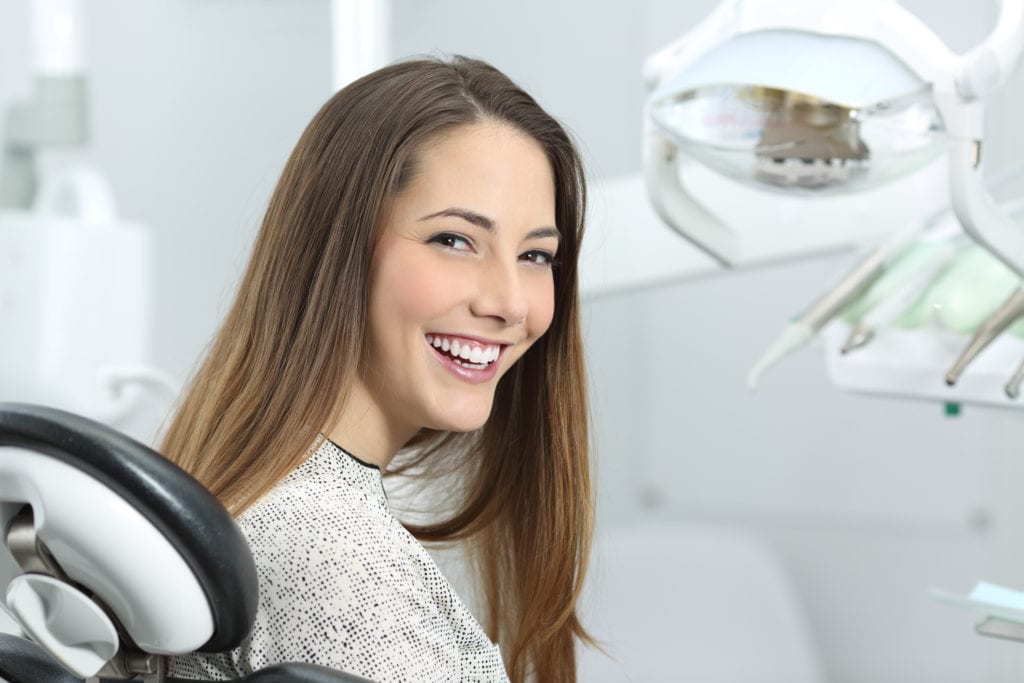A root canal procedure can save your natural tooth or teeth from extraction if you have a tooth infection. Preserving a natural tooth can help support adjacent teeth and prevent decay from spreading to other parts of the mouth. Dr. Dhara Patel performs root canals in our Hoffman Estates, IL, dental office to address advanced tooth damage or infection.
The pulp inside the root canal comprises nerves and soft tissues that can become infected and cause decay. A root canal procedure removes the infection and cleans the inner tooth chamber. Tooth extraction is a last resort for severely infected teeth. While we provide lasting restorations for patients after tooth extractions, we want to preserve your natural teeth. Our dental office also provides general dentistry services to patients in Hoffman Estates, IL.

Common Signs of Tooth Infection
A tooth infection occurs when harmful bacteria damage and break down teeth. Harmful bacteria feed on sugars and starches in the mouth. The digestive acids from these bacteria damage the tooth enamel, or outer tooth layer. Dental infections can start slowly and progress over time to permanently damage the teeth and gums. Look out for these common signs of infection before tooth decay becomes a problem:
- Toothaches
- Pain in the neck, jaw, or ear
- Difficulty breathing
- Face or cheek swelling
- Tooth sensitivity to temperature and pressure
- Face swelling
- Difficulty swallowing
If you have noticed any of these symptoms, it could be a sign of infection. Call Best Dental Spa at 847.660.6603 for cleaner and healthier teeth. Sometimes, a professional cleaning can address early signs of decay. However, if the infection reaches the inside of your tooth, you will require a root canal.
Treatment with a Root Canal in Hoffman Estates, IL
Dr. Dhara Patel offers root canal therapy to Schaumburg and Hoffman Estates, IL, patients. Depending on the patient’s needs, we complete root canal therapy during one to three office visits. To begin the procedure, Dr. Patel numbs the tooth with local anesthetic. Then, she creates a small hole through the top of the tooth into the inner tooth chamber.
Dr. Patel removes the diseased tissue, or dental pulp, cleans and disinfects the chamber, and then fills the chamber and tooth canals with a rubbery elastic material. This tooth-colored material seals the tooth and keeps decay out of the now-cleaned and disinfected tooth.
Root Canal Post-Op Care
Avoid hard and crunchy foods directly after your root canal. Stick to a soft diet at least a day after the procedure. Eat soft foods like pasta, mashed potatoes, yogurt, and jello. Additionally, avoid hot or spicy foods. Soft and mild foods will minimize sensitivity and discomfort as your tooth heals.
Do not smoke after your root canal treatment. The nicotine in tobacco products inhibits healing. It will take longer for your tooth to heal if you smoke during the healing process. You may gently brush and floss after your root canal treatment. However, avoid directly brushing your treated tooth until 24 hours after your procedure.
You will feel temporary sensitivity and discomfort directly after your root canal. Taking over-the-counter pain medication and applying a cold compress to your cheek will treat pain and swelling. Once you heal fully, you will no longer feel the tooth pain you felt with your dental infection.
Steps to Prevent Tooth Infection
There are several steps that you can take to help prevent infection at the source:
- Schedule regular checkups and cleanings
- Replace your toothbrush every 3 to 4 months
- Use dental floss after brushing your teeth
- Use fluoride toothpaste and water
- Limit sugary foods and drinks
If you have poor hygiene, a diet high in sugar, or dry mouth, you may be more prone to tooth infection than others.
Poor oral hygiene can easily build harmful bacteria on and between teeth. If you don’t floss and brush your teeth daily or sufficiently clean your teeth and gums, you can develop an infection. Sugar can also contribute to tooth decay. Consuming excessive sugar without a good oral hygiene routine creates bacterial buildup.
Dry mouth is a contributing factor to tooth decay. If you have a dry mouth, you do not have enough saliva to wash away food particles from the mouth. Saliva is integral to keeping the mouth clean. Dry mouth creates the perfect environment for harmful bacteria to grow and spread.
Visiting our dental office regularly helps improve your oral health and prevent dental problems. During dental cleanings, we remove bacterial buildup from the mouth. We also provide examinations to find signs of tooth infection. Our office will perform a visual exam and digital X-rays to find inflamed dental pulp within the tooth.
Root Canal Frequently Asked Questions
Do you want to know more about root canal treatment? Below, we answer common questions about root canals:
Is getting a root canal painful?
Getting a root canal is uncomfortable. However, the pain you experience is typically much less than the pain from the initial infection. Root canal treatment is necessary to treat deep infections, which cause intense pain. Ultimately, having a root canal procedure is to end preexisting pain.
How do you prepare for a root canal?
We recommend that patients eat before their root canal. After being sedated for your procedure, you probably will not want to eat for several hours, so having a large meal before is highly recommended. Patients are also told to avoid smoking and take medications as advised by their doctor. Some may ask you to take ibuprofen or an anti-inflammatory before the procedure.
Can I go to work after getting a root canal?
The dentist normally sedates patients for their root canal procedures. Wait 24 hours or one day before returning to work. The level of physical activity and the speaking requirements of a patient’s job may impact the time someone takes off work.
Can a cavity turn into a root canal?
Yes, a cavity can turn into a root canal if you don’t get treatment. When decay from a cavity reaches the pulp, the tooth’s innermost part, it can cause infection and severe pain. At this stage, a root canal becomes necessary to remove the infected tissue and save the tooth. Early treatment of cavities can prevent their progression and avoid needing a root canal. Regular dental check-ups can prevent them from progressing to this point.
Can I eat normally after a root canal?
After a root canal, you should avoid eating until the numbness wears off. Once it does, start with soft foods and avoid chewing on the treated tooth. Do this until your dentist places a permanent filling or crown. After the final restoration, you can return to eating normally. Follow your dentist’s advice for the best recovery and care for your treated tooth.
Can you have a root canal when pregnant?
Yes, you can have a root canal when pregnant. Most dentists consider treating infections and preventing further complications to be safe and necessary. You should inform your dentist about your pregnancy so they can take appropriate precautions. They may use special techniques to
Schedule a Dental Exam Today
Remove infection at the source with a root canal in Hoffman Estates, IL. Call Best Dental Spa today for comprehensive care at 847.660.6603. You can also request an appointment online with Dr. Patel, and we will get back to you shortly.
